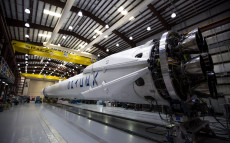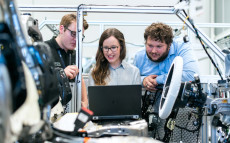- pathfindersAI
- Job Profile
Non-Destructive Testing Specialists
Summary
Non-Destructive Testing Specialists: Unseen Guardians of Quality and Safety
What They Do
Non-Destructive Testing (NDT) Specialists serve as quiet yet vital guardians of quality and safety across a broad array of industries. These professionals employ advanced technology and techniques to evaluate the integrity of materials, components, and systems without causing any damage. This allows for crucial assessments to be conducted while keeping the tested objects fully operational. From aerospace to automotive, construction to nuclear energy, NDT Specialists play an essential role in ensuring that structures and products are free from defects and perform as expected.
Job Responsibilities
The responsibilities of NDT Specialists are both multifaceted and critical. Their primary duty is to conduct inspections and tests on materials or equipment without compromising their integrity. Utilizing methods such as ultrasonic, magnetic particle, radiographic, and eddy current testing, these specialists detect flaws that might be invisible to the naked eye. Beyond conducting tests, they are responsible for analyzing test results, preparing detailed reports, and recommending necessary maintenance or repairs. Additionally, NDT Specialists often collaborate with engineers and other professionals to ensure the highest standards of quality and safety. They must also ensure compliance with industry regulations and company policies, making sure every inspection adheres to the strictest standards.
Essential Skills
To excel in the field of non-destructive testing, specialists must possess a unique blend of technical prowess and analytical acuity. Proficiency in mathematics and physics is crucial, as these sciences underpin many NDT methods. Attention to detail is another essential attribute, given the need to identify even the smallest imperfections that could compromise safety or performance. Strong problem-solving skills and the ability to interpret complex data are equally important. Moreover, effective communication skills are necessary for conveying findings and recommendations clearly, both in written reports and verbal discussions. NDT Specialists also need to be adept at using specialized equipment and software, requiring continual learning to stay abreast of technological advancements.
Educational Pathways
The journey to becoming an NDT Specialist typically begins with a solid foundation in science and mathematics during high school. Post-secondary education usually involves obtaining an associate or bachelor's degree in a related scientific or engineering discipline. Accredited NDT programs are available at various technical schools and colleges, offering focused curriculums that cover the theoretical and practical aspects of non-destructive testing. Certifications, which are often necessary to advance in this field, can be obtained through organizations such as the American Society for Nondestructive Testing (ASNT). These certifications require both coursework and hands-on experience, demonstrating proficiency in chosen methods and assuring employers of a specialist's capabilities.
Career Prospects
Career prospects for NDT Specialists are robust and varied. With the continued emphasis on safety, quality assurance, and cost-effective maintenance across industries, the demand for skilled NDT professionals is expected to grow. Employment opportunities can be found in sectors such as aerospace, manufacturing, construction, and energy. Moreover, there is potential for career advancement into senior technical roles, project management, or even consulting. The growing focus on sustainable and safe practices further enhances the job security and desirability of this career path. Given the pivotal role that NDT Specialists play in preventing failures and accidents, their expertise is highly valued and consistently in demand.
Conclusion
In conclusion, Non-Destructive Testing Specialists are indispensable to modern industry, ensuring that the unseen elements of our infrastructure and products are safe, reliable, and efficient. Their work requires a robust educational foundation, specialized skills, and a commitment to precision and continuous learning. With promising career prospects and the vital importance of their role, pursuing a career in non-destructive testing offers both personal and professional fulfillment. For those interested in a career that combines technical expertise with the crucial responsibility of safeguarding public safety, becoming an NDT Specialist represents a compelling and rewarding pathway.
Video
Compensation
| State | Median Salary | Median Hourly | Positions |
|---|---|---|---|
| AL | 62,840 | 30.21 | 790 |
| AK | 80,250 | 38.58 | 480 |
| AZ | 61,240 | 29.44 | 1,080 |
| AR | 60,760 | 29.21 | 350 |
| CA | 78,910 | 37.94 | 9,930 |
| CO | 68,470 | 32.92 | 1,540 |
| CT | 81,870 | 39.36 | 490 |
| DE | 63,950 | 30.74 | 60 |
| DC | 103,600 | 49.81 | 290 |
| FL | 64,490 | 31.00 | 2,470 |
| GA | 62,820 | 30.20 | 1,870 |
| HI | 83,840 | 40.31 | 430 |
| ID | 58,360 | 28.06 | 350 |
| IL | 74,040 | 35.59 | 1,000 |
| IN | 75,460 | 36.28 | 640 |
| IA | 58,540 | 28.15 | 620 |
| KY | 57,740 | 27.76 | 410 |
| LA | 64,370 | 30.95 | 1,800 |
| ME | 98,450 | 47.33 | 760 |
| MD | 97,370 | 46.81 | 2,450 |
| MA | 66,000 | 31.73 | 830 |
| MI | 61,990 | 29.80 | 1,910 |
| MN | 74,380 | 35.76 | 850 |
| MS | 71,410 | 34.33 | 440 |
| MO | 66,570 | 32.01 | 620 |
| MT | 61,460 | 29.55 | 210 |
| NE | 60,470 | 29.07 | 350 |
| NV | 82,660 | 39.74 | 530 |
| NH | 65,120 | 31.31 | 460 |
| NJ | 73,510 | 35.34 | 1,100 |
| NY | 60,800 | 29.23 | 2,240 |
| NC | 71,030 | 34.15 | 1,530 |
| ND | 57,120 | 27.46 | 140 |
| OH | 60,790 | 29.23 | 1,540 |
| OK | 76,790 | 36.92 | 840 |
| OR | 62,820 | 30.20 | 900 |
| PA | 66,720 | 32.08 | 2,200 |
| RI | 92,710 | 44.57 | 260 |
| SC | 80,950 | 38.92 | 580 |
| TN | 57,980 | 27.87 | 820 |
| TX | 65,150 | 31.32 | 9,090 |
| UT | 61,420 | 29.53 | 1,200 |
| VT | 55,340 | 26.61 | 190 |
| VA | 92,060 | 44.26 | 3,300 |
| WA | 91,710 | 44.09 | 2,120 |
| WV | 76,000 | 36.54 | 280 |
| WI | 60,280 | 28.98 | 740 |
| WY | 78,820 | 37.90 | 110 |
Similar Occupations
In this area you will find other occupations that are close to the one you were viewing in tasks, knowledge and work environment. If the primary job profile you are viewing isn't quite to your liking, take a look around and see what else is available.
Basic and Premium Accounts have more alternative occupations available than the Free account.

Aerospace Engineering and Operations Technologists and Technicians - 17-3021.00
Aerospace Engineering and Operations Technologists and Technicians assist in the design, testing, and maintenance of aircraft, spacecraft, and related systems and equipment. They utilize technical skills and advanced tools to ensure the functionality, safety, and efficiency of aerospace technologies and operations.
-
$77,830/yr
Median Pay -
10,640
Number of Jobs

Automotive Engineering Technicians - 17-3027.01
Automotive Engineering Technicians assist in the development, testing, and fine-tuning of vehicle systems and components by conducting performance assessments and implementing design improvements. They collaborate with engineers to troubleshoot issues, ensure compliance with safety standards, and enhance the efficiency and reliability of automotive technologies.
-
$64,020/yr
Median Pay -
38,930
Number of Jobs